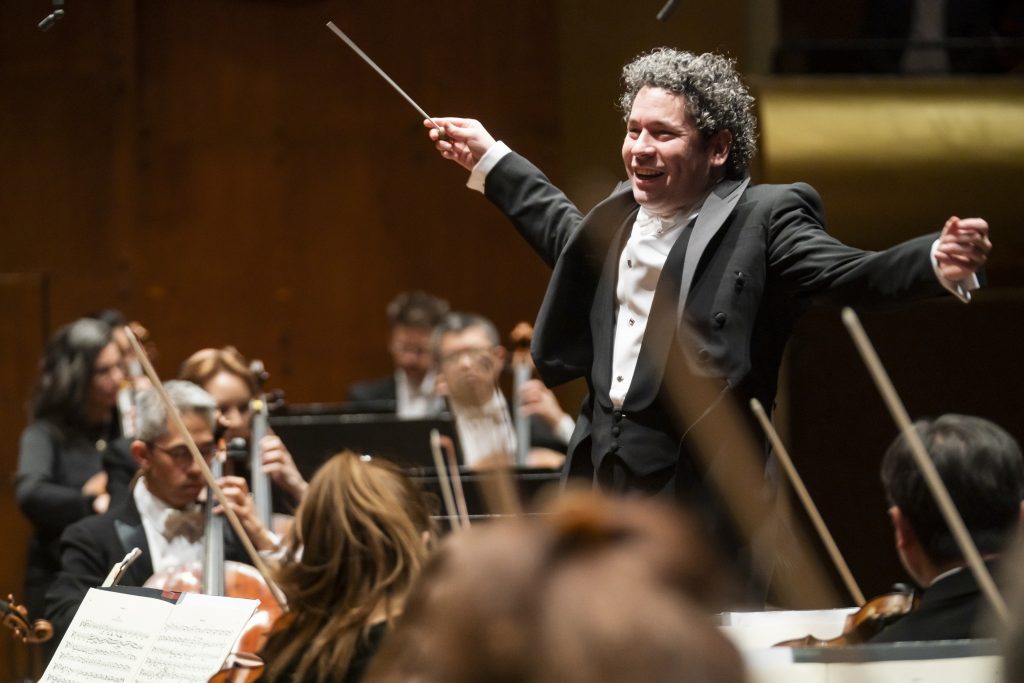Argentine premiere tops Czech standby in Dudamel’s Philharmonic visit

It seems to be a sacred rule of concert programming that a big premiere has to be paired with a bigger romantic warhorse. Gustavo Dudamel and the New York Philharmonic did just that in their Wednesday concert in David Geffen Hall, but they might have been better off sticking with the sense of adventure: it was the newest work that made the greatest impression.
Wednesday’s program opened with a Charles Ives favorite, The Unanswered Question, beautifully rendered in this performance. Over the whispered glow of the strings, the distant interjections of trumpet and winds seemed to come from another plane of consciousness, suggesting deep contemplation in their simple repetition.
The evening’s most rewarding item was the New York premiere of Universos infinitos, a piano concerto by Esteban Benzecry. This is an evocative work with a range of sonic complexions, its first movement, “Un mundo interior,” opening with a fanfare that moves quickly into a whirlwind moto perpetuo, with the piano pounding on a triple pulse. The music powers on furiously in a rough, earthy tonality, before suddenly disappearing into a quiet call-and-response that evokes the unsettling mystery of a jungle at night: a questioning phrase from the piano is answered by a skittering breeze of winds and rattling percussion.
Pianist Sergio Tiempo, Benzecry’s fellow Argentine, gave an inspired reading, showing in this first movement complete comfort with the virtuosic demands of the part, but also finding moments to pull back and draw whispering phrases out of the instrument.
“Ñuque Cuyen,” based on a simple theme for piano, shows a much brighter and more consonant sonority overall. An airy texture accompanies the flowing lines of the solo part, which Tiempo played with a breathing freedom, delicately and thoughtfully interweaving his voices. A kind of enchantment set in during this movement, turning dark as the sounds in the orchestra grew glassy and sharp.
The closing Toccata, “Willka Kuti,” returns to the initial driving pace, starting off with a chorus of dissonant bells. Furious, stomping energy in the piano is mirrored by constant commotion throughout the orchestra, a buzz of activity with various dance rhythms asserting themselves into the tumult in unexpected moments. This thrilling finale calls to mind the close of Rachmaninoff’s third piano concerto, ending in a flash of light and a blazing chordal progression in the solo part.
The main draw was Dvořák’s Symphony No. 9, the well-loved “From the New World,” making up the second half. The Philharmonic gave a capable, polished performance, but a chestnut like this needs more than that to be really memorable. Throughout the symphony, there was an odd stiffness to Dudamel’s direction whenever the dynamics were anything less than full-bore. That staleness was present right from the start of the first movement, as Dudamel drew a bright sound out of the orchestra but was overly precious with many details, making his whole interpretation seem mannered.
The Largo, with its famous “Goin’ Home” theme, was simply rushed, lacking the radiant sense of longing that makes its melody so moving. At this tempo, phrases felt unfinished and it didn’t help that the tuning in the winds was off.
The scherzo lacked drive, and again felt stilted in its trio section. Only the finale showed enough muscle, lending grandeur to the heroic theme that dominates the movement.
Wednesday’s program will be repeated Thursday at 7:30 PM, Friday at 11:00 AM, Saturday at 8:00 PM, and Tuesday at 7:30 PM in David Geffen Hall. nyphil.org


